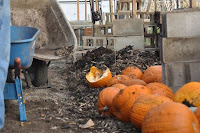
Organic gardening and farming are based on the notion that when we build our soil’s natural fertility through composting we strengthen our environment and grow the land’s capacity to provide us with health.
It’s a pretty good system when you think of it. We throw out scraps, and the scraps become our food. So simple, so elegant, so effective.
At Giving Tree Gardens, we’re such big fans of compost because we’ve seen it’s powerful results. Our gardens and lawns have all quickly filled in and grown with health and beauty using nothing but good healthy compost for fertility.

Last spring Giving Tree Gardens began working with farm partners to build Grow! Twin Cities Urban Farm. At this 12 acre city farm growers with various talents ranging from tomato and potato farming to bee keeping and mushrooming have come together to grow food for urban eaters. This farm space has been the perfect place for us to launch our composting operations.

With consultation from local composting experts Peter Kern, owner of Kern Landscape Resources, and Professor Tom Halbach, from the University of Minnesota, we designed an 85 feet long compost pile. Friends of the farm and Giving Tree Gardens employees set to work transforming our greenhouse and hauling in the compost pile’s base layers of wood chips and landscaping waste.
We now bring in 2 tons of Minneapolis’ finest coffee shop, vegetarian eatery, and beer brewery waste per week to compost inside our largest greenhouse. Composting takes place inside the greenhouse for two reasons. First, composting in the greenhouse means that our pile doesn’t stop cooking all year long. Second, and more importantly, the fact that we’re heating our greenhouse without any petroleum products means a huge environmental win for everyone involved.
If you’ve purchased food, beer, or coffee from Peace Coffee, Caffetto Coffee Shop, Tao Foods, or Second Moon Coffee Shop, then you are contributing to healthy soils, and local food production at our Grow! Twin Cities Farm.
If you’d like to support more of our farming and composting efforts, there are great ways to get involved. You can sign up to volunteer, donate to the farm, or sign up to follow our newsletter.

Many thanks to all the hard working compost helpers!


